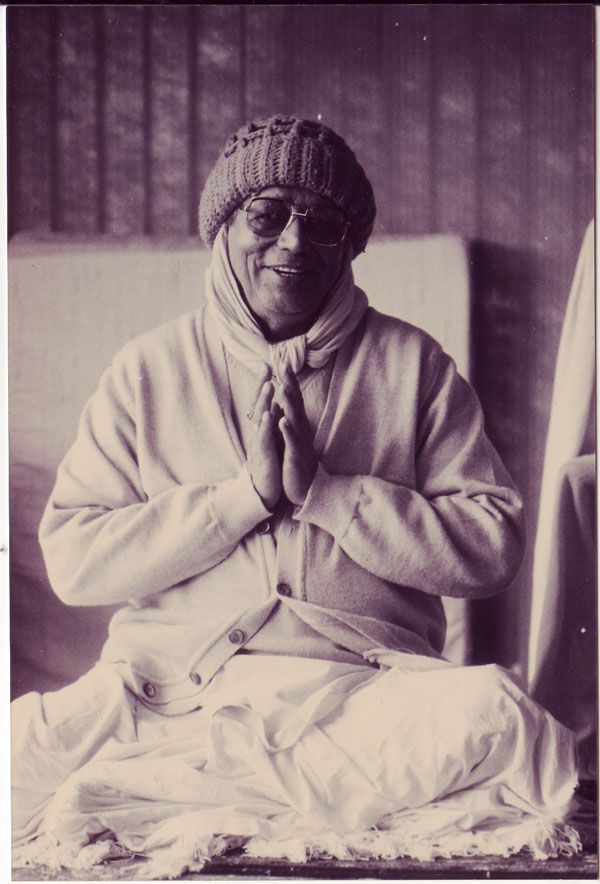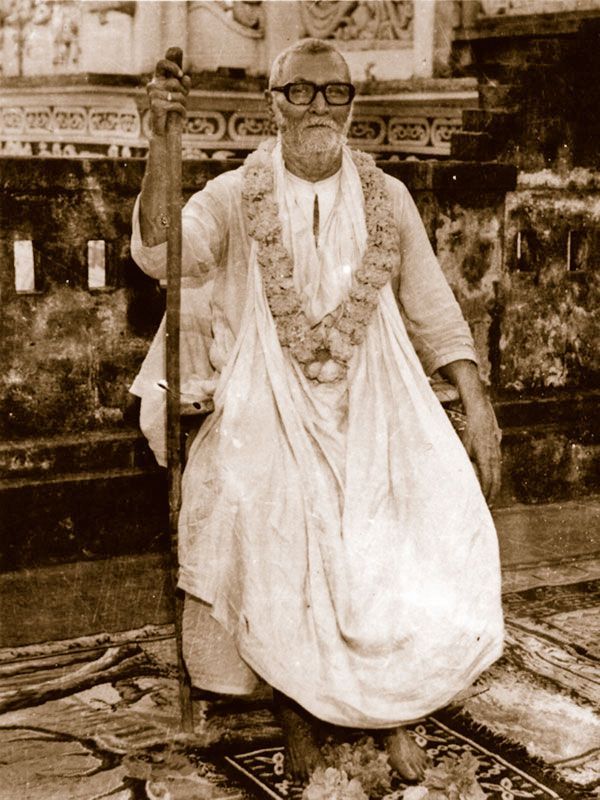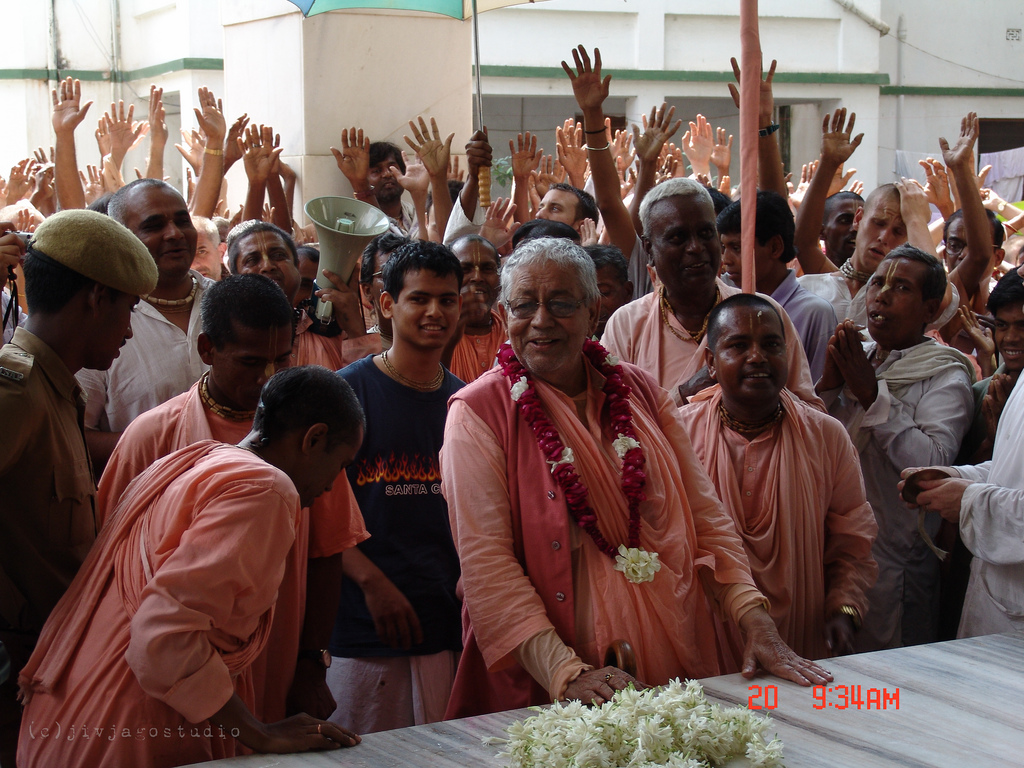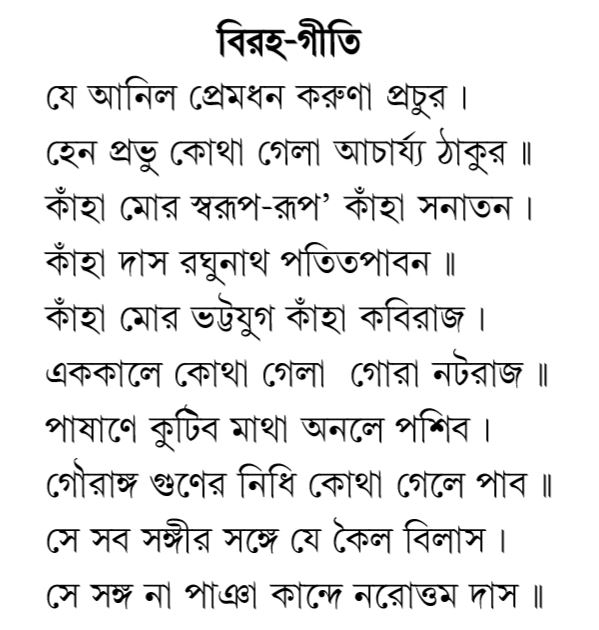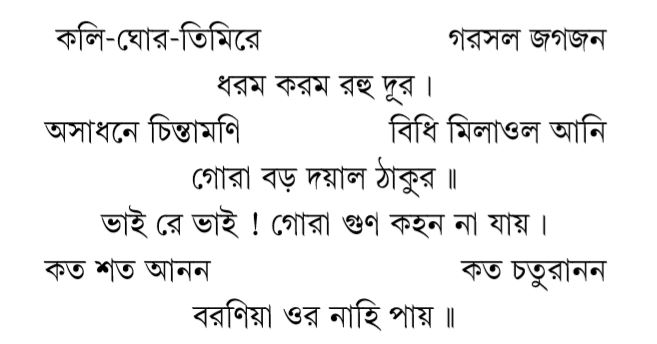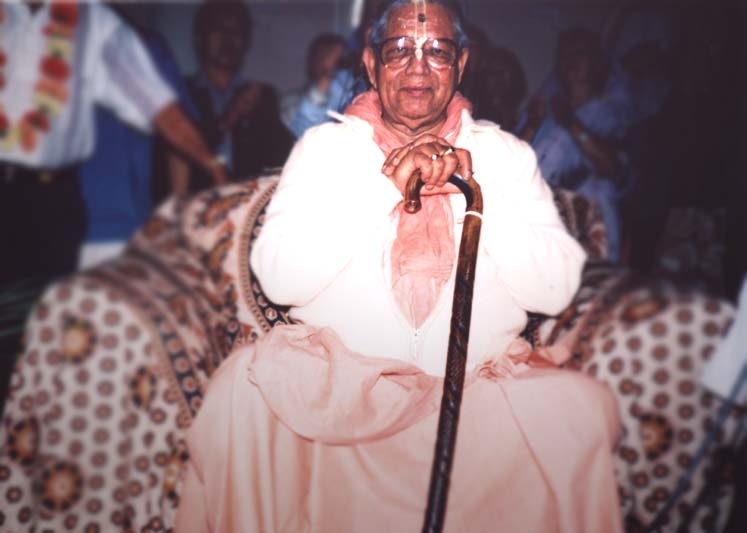This beautiful collection was produced by our Australian community from recordings of Srila Gurudev made during one of His Divine Grace’s visits to Australia during the 1990s.
Sri Guru Arati Stuti
Sri Krishna Chaitanya Prabhu doya koro more
Bhaja bhakata vatsala
Jashomati-nandana
Bhaja hu re mana
Jaya Radha Madhava
Category: Kirtan
More kirtan and other updates
We are very happy to announce several new updates:
Many additional kirtan recordings of Srila Gurudev and Srila Sridhar Maharaj which were originally published on vaisnava.com.
An ongoing, informal Bhagavad-gita discussion.
An Instagram page focused on SCSM community met on our travels, with relevant quotes from our Guru-varga.
Jadi Gaura na ho’to
Sing Gaurāṅga’s glories again and again, keeping your heart simple. In the ocean of this material world, no one has ever seen anyone so merciful.
Srila Gurudev singing Jadi Gaura na ho’to on Sri Gaura Purnima day, 28 February 1991.
yadi, gaura nā ha’ta tabe ki ha-ita
kemane dharitām de
rādhāra mahimā prema-rasa-sīmā
jagate jānāta ke? [1]
If Śrī Gaura had not come, what would have happened? How would we have maintained our lives? Who would have revealed to the world Śrī Rādhā’s glory and the extremes of Her ecstatic divine love?
madhura vṛndā- vipina mādhurī
praveśa chāturī sāra
varaja-yuvatī bhāvera bhakati
śakati ha-ita kāra? [2]
Who would have the great expertise needed to enter into the sweetness of sweet Vṛndāvan? Who would have any qualification for the Vraja-gopīs’ ecstatic devotion?
gāo punaḥ punaḥ gaurāṅgera guṇa
sarala kariyā mana
e bhava-sāgare emana dayāla
nā dekhiye eka-jana [3]
Sing Gaurāṅga’s glories again and again, keeping your heart simple. In the ocean of this material world, no one has ever seen anyone so merciful.
gaurāṅga baliyā nā genu galiyā
kemane dharinu de
vāsura-hiyā pāṣāṇa diyā
kemane gaḍiyāchhe [4]
I chant ‘Gaurāṅga’, but have not melted (with love). How have I maintained this body? How has Providence made Vāsu a stone rather than a heart?
(Śrīla Vāsudev Ghoṣ)
The Pioneer Of Sankirtan
Our Param Gurudev discusses preaching as the essence of kirtan, and the spirit of self-giving as indispensable behind all devotional practices.
You can find a full transcript and audio file of this talk here.
Question: Guru Mahārāj, very humbly I’d like to ask you a question concerning your book which I had a good opportunity to read yesterday for the first time. In the book I was very much surprised to see that the emphasis for spiritual enlightenment was in preaching, primary to japa. Japa was secondary to the preaching, the potency of preaching. And this very much surprised me because my spiritual master says that japa is the potency, the potency lies in the chanting of the Holy Name. How should I approach this?
Śrīla Śrīdhar Mahārāj: You have heard that Mahāprabhu laid stress on kīrtan. He recommended five main practices for our sādhana:
sādhu-saṅga, nāma-saṅkīrtana, bhāgavat-śravana
dhāma-vāsa, śrī-mūrtira śraddhāya sevana
sakala sādhana śreṣṭha ei pañcha aṅga
(Śrī Chaitanya-charitāmṛta: Madhya-līlā, 22.128–129)
[“One should associate with devotees, chant the holy name of the Lord, hear Śrīmad-Bhāgavatam, reside at Mathurā and worship the Deity with faith and veneration. These five limbs of devotional service are the best of all.”]
tāra madhye sarva-śreṣṭha nāma-saṅkīrtana
niraparādhe nāma laile pāya prema-dhana
(Śrī Chaitanya-charitāmṛta: Antya-līlā, 4.71)
[“Of the nine processes of devotional service, the most important is to always chant the holy name of the Lord. If one does so, avoiding the ten kinds of offences, one very easily obtains the most valuable love of Godhead.”]
Nām-saṅkīrtan, kīrtan, means to preach. The real principle, the real underlying meaning of kīrtan is to preach, to propagate.
Kīrtan, and everything, whatever is done, any form of devotion, must be devotion proper; and that means sevā, service. So our Gurudev said,
ataḥ śrī kṛṣṇa-nāmādi na bhaved grāhyam indriyaiḥ
sevonmukhe hi jihvādau svayam eva sphuraty adaḥ
(Śrī Bhakti-rasāmṛta-sindhu)
(“Although Kṛṣṇa’s Name, Form, Qualities, and Pastimes cannot be grasped by the material senses, through the spirit of dedication they manifest themselves on the tongue and to the other senses.”)
We want a connection with the super-subjective area, so only our hankering, sincere hankering for Him, and our attitude of surrender to His cause can attract Him to our level. That is transcendental; how can I come in connection with the transcendental? When I offer myself for His cause, His service. Then He will care to come down to give connection to me. So whatever transcendental affairs we are going to connect ourselves with, the sevonmukhata, this sort of spirit, attitude, must be there. Otherwise it will be only a repetition of mundane feats. Sevonmukhata, to practise to dedicate one’s own self, is mainly necessary. Whether we do kīrtan, śravaṇ, smaran, or vandan, everywhere this common factor must be present: that I want to dedicate myself for the cause of the higher, and not that I want to use the higher principle for my lower purpose. This tenor must be observed first.
And kīrtan means to preach. Saṅkīrtana tāra madhye sarva-śreṣṭha (“Of all practices of devotion, saṅkīrtan is the best”): it is difficult to control the mind, the inner aspect, but when we challenge some other person’s conception, we cannot but be all-conscious; we cannot talk irrelevantly, so we can easily have concentration when we talk about Him. That is kīrtan. When engaged in japam, my mind may wander here and there, everywhere, but when I am engaged in kīrtan, I must be all attentive, so we can control the mind which is very difficult to capture and to utilise. So kīrtanaṁ tu tato varam. Oṣṭha-spandana-mātreṇa kīrtanaṁ tu tato varam (Vaiṣṇava-chintāmaṇi): special stress has been put on kīrtan by Mahāprabhu.
Kīrtan means to preach. The environment has come and is prepared to attack me, so I shall rather make ‘offensive for offensive’—I shall attack the environment. Kīrtan means that. The whole environment is surcharged with the spirit of offensive; they are coming and attacking me from different directions, through different ideas that are already like spies within us, their agents. So, I shall take the offensive and attack the environment with the power that I received from Gurudev. That power will generate within me, and I shall attack the environment with that. That is what kīrtan means.
We are told, we have heard from our Gurudev, Bhakti Siddhānta Saraswatī, in this way, and we are trying to preach that thing to others. This is the tenor of his preaching. Preaching means to attack the environment, not to lie down passively and allow others to attack. Japam is very feeble, a weak thing: you begin japam, and whenever you awake you will find that your mind is marketing in some other place. But when you are talking about Kṛṣṇa, Mahāprabhu, to others, you cannot but be all attention. You can’t talk irrelevantly; you can automatically control your attention when doing kīrtan, when preaching. That is the advantage of kīrtan.
Our Vṛndāvan Dās Ṭhākur has also given another point. One who is doing japam is feeding himself, but one who is making kīrtan is feeding so many others. And he will receive that reaction, so his cause will be enhanced more and more. In this way we have understood it.
This is the justification of what is told in Search for Kṛṣṇa about kīrtan. Now you are to choose. I gave my explanation.
Sevonmukhe hi: our Gurudev laid stress in practising what is sevā. One must not only be disinterested, but one must be Kṛṣṇa-interested, Guru-interested. Guru is the agent representing Kṛṣṇa’s cause, and setting aside all my tendencies within, I shall surrender to the dictation of Gurudev. I shall ignore my inner impressions, and their suggestions, and inviting only what is coming from high, through my Gurudev, I shall do that. That is to practise and acquire the habit of service: self-abnegation, and to invite some higher tendency to work within me. Thereby we can acquire, we can know, we can understand what is service proper, sevonmukhata. Self-abnegation, and inviting the higher tendency to work within me with all my efforts. Total transformation is necessary through the agency of the higher world, and with that attitude I shall take the Name. Whatever I shall do, that attitude, that life must be present there, of sevonmukhata: what I am doing is not for me, but for the centre, for Kṛṣṇa. And the guarantee is Gurudev, the agent. This is the explanation.
Devotee: So japa is rather a prayer that we want to do kīrtan.
Śrīla Śrīdhar Mahārāj: It is within. Japa is within, and the disturbance is able to attack. And also, others are not being benefitted there. What did Mahāprabhu do? He is the pioneer of saṅkīrtan, not of japam.
kalau saṅkīrtanādyaiḥ sma kṛṣṇa-chaitanyam āśritāḥ
(Bhāgavat-sandarbha, verse 2)
yajñaiḥ saṅkīrtana-prāyair yajanti hi sumedhasaḥ
(Śrīmad Bhāgavatam: 11.5.32)
(“In the Age of Kali, intelligent persons perform congregational chanting to worship the incarnation of Godhead who constantly sings the name of Kṛṣṇa. Although His complexion is not blackish, He is Kṛṣṇa Himself. He is accompanied by His associates, servants, weapons and confidential companions.”)
Mahāprabhu came for saṅkīrtan. Japam is sevā mānase karibe. In Mahāprabhu’s instructions to Raghunāth Dās Goswāmī he says,
[grāmya-kathā nā śunibe, grāmya-vārtā nā kahibe]
bhāla nā khāibe āra bhāla nā paribe
amānī mānada hañā kṛṣṇa-nāma sadā la’be
vraje rādhā-kṛṣṇa-sevā mānase karibe
(Sri Chaitanya-charitamrta: 3. 6.236–237)
(“Do not talk like people in general or hear what they say. You should not eat very palatable food, nor should you dress very nicely. Do not expect honour, but offer all respect to others. Always chant the holy name of Lord Kṛṣṇa, and within your mind render service to Rādhā and Kṛṣṇa in Vṛndāvana.”)
Vraje-sevā is not for the public. If you are in that stage, you will continue that within yourself, within your mind, and not publicly. And before we reach that stage, we shall do everything publicly. Amānī mānada [we shall give respect without expecting it in return]. And our nature will be the spirit of toleration, and also to avoid causing any unnecessary disturbance to the environment, as much as possible.
Devotee: So that means we are attacking the environment, but we can’t disturb the environment.
Śrīla Śrīdhar Mahārāj: But our attitude should be passive, cool, that of a master, a master-like attitude. We shall attack our enemy, but the process must be grand, not like a weak man. We shall attack our enemy with dignity, with a dignified attitude. At heart we shall be well-meaning, “I want his good, and my cause is infinite, and he is within a teeny shell taking shelter.” We shall take a dignified position.
tṛṇād api sunīchena taror api sahiṣṇunā,
amāni[nā mānadena kīrtanīyaḥ sadā hariḥ]
(“The Lord’s Name may be always chanted by one who is more humble than a blade of grass, tolerant like a tree, free from desire for respect, and who offers respect to others.”)
And my attack will be of such nature that it will invite universal force for my backing, support.
Rāmānuja had a discourse with a māyāvādī for fourteen days, a strong fight. But Rāmānuja could not crush him. Then he came and prayed to Varadarāja, “What is this? You have accepted me as the Āchārya of a particular group, and I cannot defeat that māyāvādī. So what will be, Varadarāja? It is a very insulting position that I have created for You. I am now nothing, nowhere.” Anyhow, the engagement was there, Rāmānuja had to go and face his strong opponent; and as soon as he went, that māyāvādī fell at his feet, “Yes, I have recapitulated what you told in my mind, and that is true; and what I have told, that is false. I could understand.”
Our power is above. Varadarāja willed, and he at once fell at the feet. So, we must always be conscious of our Gurudev, Mahāprabhu. We are teeny persons, what power have we got? All our capital, the source of our success, is above our head with the Vaiṣṇava, with Guru. With this attitude we are to fight. Not to create our own egoism, to develop our own egoism; not for that, but for His cause. We are to go on in this way, with all sincerity.
When fighting with others, if I came to such a position that I couldn’t follow things properly, I used to ask myself, “Why am I here? What is my cause? Why am I supporting this?” Then I got my answer from within, “For this reason I am here.” So in that way, in many places, I could cross the layer of the oppositionist. “Have I come here with some ulterior motive, or with some sincere and higher motive?” Then if I analyse that, it will come out why I have come. “Why have I not gone to attend the māyāvādī school? Not the karmi school, not the patriots, nor others—why have I not joined them? Instead I have exclusively joined Mahāprabhu—why? What attracted me?” In this way.
Devotee: Now I have understood, but at the same time I’m much more in a turmoil, because I raised this point with my Gurudev and he said we are bhajanānandī, we are not goṣṭhyānandī…
Śrīla Śrīdhar Mahārāj: You may ask your Gurudev, and he may explain to you further, what is more private instruction for you: “I came to read this book, and there the stress is laid on the kīrtan, and the service, and you say japam. How can we harmonise, adjust?” You may ask him. And as he will tell, you do.
Devotee: There is one other question I would like to raise Mahārāj. When does one come to the understanding that one is serious? When do we come to the point when we are taking Harinam seriously?
Śrīla Śrīdhar Mahārāj: Harinam begins from the lowest position and goes up to the highest. Even the most fallen can get Harinam with only the connection of the sadhu. It is for all; at all possible stages, at all possible of fallen states, Harinam can help us. And at the same time, it goes to the highest position. But the meaning, the development in the Name, will change through the taker. By the devotee’s taking the Name of Kṛṣṇa, the whole nerve is getting jerked. And ordinary people, what will they get? They will wholesale will be attracted; it will draw the extract and take to Kṛṣṇa. The sound will squeeze our existence, our dedication, and take it to Kṛṣṇa. The result will be different depending on who is chanting, but anyone can take the Name. Rādhārāṇī is taking the Name of Kṛṣṇa. So many things may be: it is infinite. It is not finite, that we shall draw a line, “So far and no further.” It is all infinite: the sound is infinite, the figure, rūpa, colour. It is all infinite, different aspects of the infinite.
Rādhārāṇī says, “My life is sure to meet disaster and despair.” Why? She is saying to Her friends: “I have heard the Name of Kṛṣṇa, and I have surrendered fully there. I have seen the portrait of Kṛṣṇa and I have surrendered.” She does not know, still now, that the Name of Kṛṣṇa and the portrait are one and the same. So She is representing it in this way: “I have heard the Name, and I surrendered completely there. Again I found a picture, and I surrendered to that picture. And another, I heard the flute sound, and I surrendered there. So I have surrendered in three places, My friends, how can I get peace in My mind? So My life is finished, gone. I am expecting a disastrous end, I am wholesale spoiled.”
But when those three come into one, the Name, and the flute, and the portrait, what degree of joy is there! The Name has attracted Her to be empty. So what is there and what is that Name to us? It is the degree of love and affection with which we do the work, do the Name, or do service to the Deity, or whatever form outside—the inner spirit will be the be-all and end-all, everything is there. With what attitude am I approaching? Self-giving, ātmā-nivedan, sarva-svātma-nivedane, is the very criterion: how far one has surrendered himself, to what degree, for the cause? All other functions will depend on this truth, with how much intensity he has dedicated to taking the Name, or to the service of Guru, or to the Deity, or whatever, to preach, whatever—but what is the intensity of the dedication for the satisfaction of the Lord.
The gopis are not engaged always in japam, or always taking the Name on the beads, but their every activity is attracting Kṛṣṇa towards them. So all our movements will be such that they will attract Kṛṣṇa; they will be meant only to satisfy Kṛṣṇa, and nothing else. We will not do with only the lip, or the mind, or the body, with all its limbs, but everything, wholesale transformation is necessary. We shall live and move for Him. Not for anything else. That is what is the desired end. We belong completely to Him, as His slave, and He can make or mar. He has got every right over me. He may play with me in any way He likes, as playdough. Our dedication towards Him will be so much, of such quality. We must reach there any how.
The age of kirtan
You can find a full transcript and audio recording of this talk here.
Sriman Mahaprabhu said,
bahubhir militvā yat kīrtanaṁ tad eva saṅkīrtanam
Congregational chanting is sankirtan, and if we can do sankirtan without offence we must be benefitted. In Kali-yuga the only religion for the conditioned souls is Harinam-sankirtan. We can see this in the scriptures, all over the Vedic literature.
Sriman Mahaprabhu appeared five hundred years ago in Sridham Nabadwip, Mayapur for that yuga-dharma, for spreading Krishna consciousness, in this mundane world. In Chaitanya-charitamrta we can see,
kali-yuga-dharma hari-nāma-saṅkīrtana
tāhā bilāite prabhura nade āgamana
The religion of the conditioned souls, of all the jiva-souls, in this age of Kali is Harinam-sankirtan. In Srimad Bhagavatam, the gist of all the Vedic scriptures, we can see,
kṛṣṇa-varṇaṁ tviṣākṛṣṇaṁ sāṅgopāṅgāstra-pārṣadam
yajñaiḥ saṅkīrtana-prāyair yajanti hi sumedhasaḥ
(Śrīmad Bhāgavatam: 11.5.32)
In Kali-yuga, Harinam-sankirtan is the only process, and it is a very sweet and very easy process to go to our destiny, Goloka Vrndavan, where we can get service to Lord Krishna. Here we are in the plane of exploitation: everybody is trying to exploit everybody else and this is the nature of this mundane world. But in the transcendental, spiritual, world, all the divine entities are always engaged in service to the Lord. All entities are serving everyone else in favour of Sri Krishna, and they are getting joyfulness, they are getting ecstasy, they are getting love, beauty, charm, and so on. We can see this description in Brahma-samhita.
We can see four ages in this mundane world: Satya, Treta, Dvapara, and Kali. Every age has a religion for rescuing the jiva-souls. We can see in the scriptures that the process is different in every yuga. We can see that there is also a chanting process in every age, but it is different. The Satya-yuga chanting process is:
nārāyaṇa-para vedā nārāyaṇa-parākṣarāḥ
nārāyaṇa-parā muktir nārāyaṇa-parā gatiḥ
Treta-yuga:
rāma nārāyaṇānanta mukunda madhusūdana
kṛṣṇa keśava kaṁsāre hare vaikuṇṭha vāmana
Dvapara-yuga:
hare murāre madhu-kaiṭabhāre
gopāla govinda mukunda saure
yajñeśa nārāyaṇa kṛṣṇa viṣṇo
virāśrayaṁ māṁ jagadīśa rakṣa
And Kali-yuga:
hare kṛṣṇa hare kṛṣṇa kṛṣṇa kṛṣṇa hare hare
hare rāma hare rāma rāma rāma hare hare
This is the process given by Mahaprabhu, Sri Chaitanyadev. Nama-sankirtan was revealed in this mundane world through Sri Chaitanya Mahaprabhu. Kali means the age of quarrel, and we can see all inauspiciousness in Kali-yuga, but one auspicious thing is that,
kaler doṣa-nidhe rājann asti hy eko mahān guṇaḥ
kīrtanād eva kṛṣṇasya mukta-bandhaḥ paraṁ vrajet
(Śrīmad Bhāgavatam: 12.3.51)
Many things are bad—actually we can say that everything is bad in Kali-yuga—and there is no practical religion the jiva-souls can practise. And because of that one topmost facility is given by Krishna, that if we can chant His Name properly, without offence, then we can get liberation from this bad environment and we can establish ourselves in the divine service plane of Goloka Vrndavan where we can exclusively do seva to Sri Sri Radha Govinda.
In other ages we can see that the practising process is very hard.
kṛte yad dhyāyato viṣṇuṁ tretāyāṁ yajato makhaiḥ
dvāpare paricharyāyāṁ kalau tad dhari-kīrtanāt
(Srimad Bhagavatam: 12.3.52)
[“Whatever results were obtained by meditating on the Personality of Lord Vishnu in Satya-yuga, or by performing elaborate sacrifices in Treta-yuga, or by performing Deity worship in Dvapara-yuga, can be obtained in Kali-yuga by simply performing the congregational chanting of the Holy Names of Lord Hari.”]
With so much austerity what result was obtained in the other three yugas, the conditioned souls of this Kali-yuga can get very easily through following this very happy process, and they are getting more than that: liberation, and after liberation, service to Krishna.
harer nāma harer nāma harer nāmaiva kevalam
kalau nāsty eva nāsty eva nāsty eva gatir anyathā
(Bṛhan-Nāradīya-purāṇa)
Mahaprabhu said this mahamantram is the only process to get real liberation and entrance to the transcendental service world. Actually we are all the members of that transcendental service world, but unfortunately we came here and are experiencing birth and death, sadness, happiness, and many things here. But it is all anitya, temporary, and our permanent plane is the service plane; that is actually our home. Everyone is serving and getting happiness, joyfulness, ecstasy, nectar, love, beauty, charm, and all fulfilment there in our home and we need to go that place, and the process in Kali-yuga is Harinam-sankirtan. This is the scriptural advice and Mahaprabhu actually manifested it. Punah pravartaka: through Mahaprabhu it was revealed in this mundane world. Then we have no other intention and we have no need to take other facilities from the scriptures: if we can only take that facility, we must be benefitted.
After Sriman Mahaprabhu, his dearmost associates, the six goswamis and others, preached Harinam-sankirtan in this world and in this age it was widely preached by Srila Bhakti Siddhanta Saraswati Thakur. He preached this conception of Harinam-sankirtan all over India, and he tried to preach it all over the world. Today we can see how it has spread all over the world by our divine master Srila A.C. Bhaktivedanta Swami Prabhupad and also our Srila Guru Maharaj, Om Visnupad Srila Bhakti Raksak Sridhar Deva-Goswami. Now all over India, and all over the world, they are getting much peace, joy, and happiness through chanting the Hare Krishna mahamantra. All over the world the conditioned souls are becoming inspired with this mahamantra. We are also a part of that, and we are feeling much happiness.
Avatara Sara
Śrī Gaura Avatār is the best of all Avatārs. Why don’t you serve Him? O mind, you resided beside water, but did not quench your thirst.
download MP3 audio
Srila Gurudev singing Avatara sara on Gaura Purnima day, 28 February 1991.
avatāra sāra gorā avatāra
kena nā bhajili tā̐re
kari’ nīre vāsa gela nā piyāsa
āpana karama phere [1]
Śrī Gaura Avatār is the best of all Avatārs. Why don’t you serve Him? O mind, you resided beside water, but did not quench your thirst. You returned to your selfishness.
kaṇṭakera taru sadāi sevili (mana)
amṛta pā’bāra āśe
prema-kalpataru śrī gaurāṅga āmāra
tāhāre bhavili viṣe [2]
O mind, desiring to drink nectar, you constantly chewed thorned wood (and mistook the blood in your mouth for nectar). My Lord Gaurāṅga is a wish-fulfilling tree of divine love, but you considered Him to be poison.
saurabhera āśe palāśa śuṅkili (mana)
nāsāte paśila kīṭa
‘ikṣu-daṇḍa’ bhāvi’ kāṭha chuṣili (mana)
kemane pāibi miṭha [3]
O mind, seeking a fragrance, you smelled the odourless palāśa flower, and insects entered your nose. O mind, considering it sugarcane, you sucked dry wood. How will you taste sweetness in this way?
‘hāra’ baliyā galāya parili (mana)
śamana kiṅkara sāpa
‘śītala’ baliyā āguna pohāli (mana)
pāili vajara-tāpa [4]
O mind, considering it a necklace, you wore death’s attendant serpent around your neck. O mind, considering it to be cooling, you embraced fire and received a scorching burn.
saṁsāra bhajili śrī-gaurāṅga bhulili
nā śunili sādhura kathā
iha-parakāla dukāla khoyāli (mana)
khāili āpana māthā [5]
You served your family (mundane ends), forgot Śrī Gaurāṅga, and never listened to the sādhus’ words. O mind, you wasted both this life and your next life. You depraved yourself.
(Śrīla Lochan Dās Ṭhākur)
“Where are the saviours of the fallen souls?”
Where are my Svarūp, Rūpa, and Sanātan? Where is my Raghunāth Dās? Where are the saviours of the fallen souls?
Srila Gurudev singing Ye anilo prema dhana on 29 June 1992 in San Jose, USA, on the disappearance day of Srila Bhakti Vinod Thakur.
Download MP3 audio
ye ānila prema-dhana karuṇā prachura
hena prabhu kothā gelā āchārya ṭhākura [1]
Where has Advaita Āchārya, the Lord who mercifully brought the wealth of divine love to this world, gone?
kā̐hā mora svarūpa rūpa kā̐hā sanātana
kā̐hā dāsa raghunātha patita-pāvana [2]
Where are my Svarūp, Rūpa, and Sanātan? Where is my Raghunāth Dās? Where are the saviours of the fallen souls?
kā̐hā mora bhaṭṭa-yuga kā̐hā kavirāja
eka-kāle kothā gelā gorā naṭa-rāja [3]
Where are my Raghunāth Bhaṭṭa and Gopāl Bhaṭṭa? Where is my Kṛṣṇadās Kavirāj? Where has the great dancer Śrī Gaurāṅga suddenly gone?
pāṣāṇe kuṭiba māthā anale paśiba
gaurāṅga guṇera nidhi kothā gele pāba [4]
I will break my head on a rock, I will enter into fire—where shall I go to reach the reservoir of all qualities, Śrī Gaurāṅga?
se saba saṅgīra saṅge ye kaila vilāsa
se saṅga nā pāñā kānde narottama dāsa [5]
Not finding the association of Śrī Gaurāṅga, who performed His Pastimes with all these associates, Narottam Dās weeps.
(Śrīla Narottam Dās Ṭhākur)
In the palm of your hand
O my brother! O my brother! No one has told you the glories of Lord Gaura. How great is Lord Brahmā? How great is Lord Śeṣa? They cannot eclipse the greatness of Lord Gaura.
Srila Gurudev singing Kali ghora timire on Gaura Purnima day, 28 February 1991.
Download mp3 audio here.
kali-ghora timire garasala jagajana
dharama karama bahu-dūra
asādhane chintāmaṇi vidhi milāola āni
gorā boḍo doyāla ṭhākura [1]
The people of this world have now been devoured by the dense darkness of this age of Kali and all good activities have gone far away. Thus they are apathetic to the transcendental gems offered by the greatly merciful Lord Gaura.
bhāi re bhāi! gorā guṇa kohone nā jāya
koto śata-ānana koto chatur-ānana
boroṇiyā ora nāhi pāya [2]
“O my brother! O my brother! No one has told you the glories of Lord Gaura. How great is Lord Brahmā? How great is Lord Śeṣa? They cannot eclipse the greatness of Lord Gaura.
chāri veda ṣaḍ-dara-śana kori adhyayana
se jadi gaurāṅga nāhi bhaje
vṛthā tāra adhyayana lochana vihīna jana
darpaṇe andhe kibā kāje [3]
“What use are the four Vedas and the six systems of philosophy if one does not worship Lord Gaurāṅga? Why study them? What use is a mirror to a blind man?
veda vidyā dui kichui nā jānata
se jadi gaurāṅga jāne sāra
nayanānanda bhone sei to sakali jāne
sarva-siddhi karatale tāra [4]
“If one knows the two kinds of Vedic knowledge, he still does not know anything. But if one knows Lord Gaurāṅga, he knows the most precious knowledge. Nayanānanda says: Such a person knows everything. All perfections stay in the palm of his hand.”
(Srila Nayanananda Das)
The path to divine love
“One whose wealth is Śrī Gaurāṅga’s feet knows the essence of devotion’s rasa. The heart of one who hears Śrī Gaurāṅga’s sweet Pastimes becomes pure.”
Srila Gurudev singing Gaurangera duti pada in the year 1989.
Srila Gurudev singing Gaurangera duti pada on Gaura Purnima day, 28 February 1991.
gaurāṅgera duṭi pada yāra dhana sampada
se jāne bhakati-rasa-sāra
gaurāṅgera madhura-līlā yāra karṇe praveśilā
hṛdaya nirmala bhela tāra [1]
One whose wealth is Śrī Gaurāṅga’s feet knows the essence of devotion’s rasa. The heart of one who hears Śrī Gaurāṅga’s sweet Pastimes becomes pure.
ye gaurāṅgera nāma laya tāra haya premodaya
tāre muñi yāi balihāri
gaurāṅga-guṇete jhure nitya-līlā tāre sphure
se jana bhakati-adhikārī [2]
One who chants Śrī Gaurāṅga’s Name develops divine love. To him, I say, “Bravo!” The eternal Pastimes are revealed to one who cries over Śrī Gaurāṅga’s qualities. Such a soul is qualified for devotion.
gaurāṅgera saṅgi-gaṇe nitya-siddha kari māne
se yāya vrajendra-suta-pāśa
śrī-gauḍa-maṇḍala-bhūmi yebā jāne chintāmaṇi
tāra haya vraja-bhūme vāsa [3]
One who considers Śrī Gaurāṅga’s associates to be eternally liberated reaches Kṛṣṇa. One who knows the holy land of Gauḍa to be made of wish-fulfilling (spiritual) gemstone resides in the land of Vraja.
gaura-prema-rasārṇave se taraṅge yebā ḍube
se rādhā-mādhava-antaraṅga
gṛhe vā vanete thāke ‘hā gaurāṅga’ bale ḍāke
narottama māge tāra saṅga [4]
One who swims in the waves of the nectarean ocean of divine love for Śrī Gaura is an intimate associate of Śrī Śrī Rādhā-Mādhava. Whether he lives in a house or in the forest, Narottam Dās begs for the association of one who calls, ‘O Gaurāṅga!’
(Śrīla Narottam Dās Ṭhākur)
Door to door grace
“The anger-less, prideless, supremely joyful Nityānanda Rāy wanders throughout the towns. Going from door to door to the homes of the lowly and fallen souls, He distributes the Hare Krishna mahāmantra.”
Srila Gurudev singing Akrodha paramananda, in the year 1989.
Download mp3 audio
akrodha paramānanda nityānanda rāya
abhimāna-śūnya nitāi nagare beḍāya [1]
The anger-less, prideless, supremely joyful Nityānanda Rāy wanders throughout the towns.
adhama patita jīver dvāre dvāre giyā
hari-nāma mahāmantra dena bilāiyā [2]
Going from door to door to the homes of the lowly and fallen souls, He distributes the Hare Krishna mahāmantra.
yāre dekhe tāre kahe dante tṛṇa dhari’
āmāre kiniyā laha bhaja gaurahari [3]
With straw between His teeth, He says to whoever He sees, “Purchase Me: simply serve Gaurahari.”
eta bali’ nityānanda bhūme gaḍi yāya
sonāra parvata yena dhūlāte loṭāya [4]
Saying this, Nityānanda rolls on the ground like a golden mountain rolling in the dust.
hena avatāre yāra rati nā janmila
lochan bale sei pāpī ela āra gela [5]
Lochan Dās says of one who has not developed attachment to this Avatār, “Such a sinner simply came and went.”
ekabar bhaja bhaja bhai
Oh brothers, just once serve.
prema-data gaura-nitai bhaja bhaja bhai
Oh brothers, serve Gaura-Nitai, the givers of prema.
saparsada gaura-nitai bhaja bhaja bhai
Oh brothers, serve Gaura-Nitai and Their associates.
nitai gaura haribol, haribol, haribol, haribol
Chant Nitai, Gaura, Hari.

